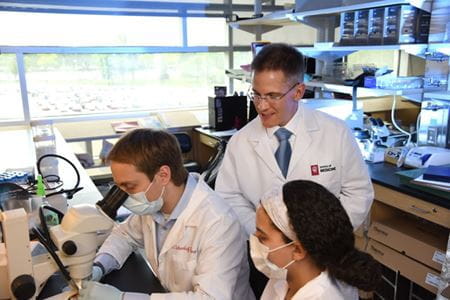The Department of Ophthalmology at Indiana University School of Medicine has been awarded a grant from the National Institutes of Health that aims to attract more medical students to participate in eye research.
The ophthalmology department recently learned it was the chosen recipient of a $250,000 NIH T35 training grant. These funds allow for the creation of short-term positions in laboratories for first-year medical students to learn and work alongside professional researchers.
The hope is that exposing medical students to eye research early on in their education will inspire them to enter the field and conduct eye research of their own, said Tim Corson, PhD, the department’s director of basic and translational research and co-principal investigator on the grant along with department chair David Wallace, MD, MPH.
The grant the department received—which will be distributed in $50,000 increments over five years—comes from the National Eye Institute, with some additional matching funds from the university.
The program aligns with the Indiana University Medical Student Program for Research and Scholarship, or IMPRS, IU School of Medicine’s official program for summer medical student research. Space for eight medical students interested in ophthalmology will be added to IMPRS, and about 20 ophthalmology faculty members have agreed to serve as the mentors who will formulate the projects that the medical students will investigate for 12 weeks during the summer. All projects will be virtual for the first year due to COVID-19.
This opportunity is specifically designed to attract those who are between their first and second years of medical school, Corson said. It might seem early, but it’s an ideal point in their education to take on such projects, he said.
Each student will participate in a “bootcamp” on basic ophthalmology skills and information—a series of short Zoom lectures of various field-related topics, Corson said—at the start of the summer to ensure they are properly equipped to move forward successfully in the research program.
Hopefully by summer’s end, some students will be inspired to choose ophthalmology as a specialty—and particularly pursue research in the field, Corson said.
There has always been a steady flow of medical students who express an interest in practicing clinical ophthalmology once they’ve earned their medical degrees; but the department would like to inspire more students to become clinician investigators curious about the maladies of the eye, Corson said.
